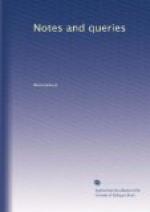and probably many others; but I have no list before me, and these are all that occur.
Philologos.
Deanery of Gloucester, Shrove Tuesday, 1850.
* * * * *
PARALLEL PASSAGES OR PLAGIARISMS IN CHILDE HAROLD.
Permit me to add two further plagiarisms or parallel passages on the subject of Childe Harold to those already contributed by your valuable correspondent “Melanion.”
Mrs. Radcliffe (who I am informed was never out of England) is describing in her Mysteries of Udolpho, Chap. xvi. the appearance of Venice. “Its terraces, crowded with airy, yet majestic fabrics touched as they now were with the splendour of the setting sun, appeared as if they had been called up from the Ocean by the wand of an enchanter.”
In the 1st stanza of the 4th canto of Childe Harold we have the well known lines—
“I stood in Venice on the bridge
of sighs,
A palace and a prison on each hand:
I saw from out the wave her structures
rise
As from the stroke of the enchanter’s
wand.”
In one of his letters Lord Byron tells us of his fondness for the above novel.
Again in Kirke White’s Christiad—
“The lyre which I in early days
have strung,
And now my spirits faint, and I have hung
The shell that solaced me in saddest hour
On the dark cypress—”
May be compared with the last stanza but one of the 4th canto.
T.R.M.
* * * * * {300}
INEDITED LINES BY ROBERT BURNS.
The following lines by Robert Burns have never appeared in any collection of his works. They were given to me some time ago at Chatham Barracks by Lieut. Colonel Fergusson, R.M., formerly of Dumfriesshire, by whom they were copied from the tumbler upon which they were originally written.
Shortly before the death of Alan Cunningham I sent these verses to him, as well as two Epigrams of Burns, “On Howlet Face,” and “On the Mayor of Carlisle’s impounding his Horse,” which were not included in his edition of Burns’ works. In a letter which I received from Alan Cunningham, and which now lies before me, he says:—
“The pieces you were so good as to send me are by Burns, and the Epigrams are old acquaintances of mine. I know not how I came to omit them. I shall print them in the next edition, and say it was you who reminded me of them.”
I believe that one or both of the Epigrams were printed in the 8vo. edition of the works in one volume, but my name is not mentioned as the contributor, which I regret; for, as an enthusiastic admirer of Burns, and a collector for many years of his fugitive pieces, it would have been gratifying to me to have been thus noticed. Perhaps Cunningham did not superintend that edition.




